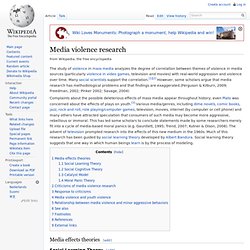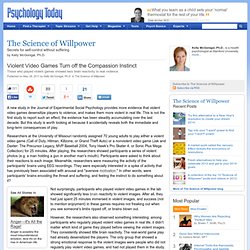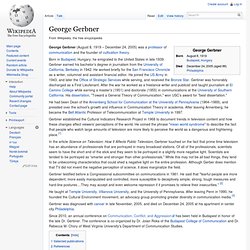

Wiki - Media Violence Research. The study of violence in mass media analyzes the degree of correlation between themes of violence in media sources (particularly violence in video games, television and movies) with real-world aggression and violence over time.

Many social scientists support the correlation.[1][2] However, some scholars argue that media research has methodological problems and that findings are exaggerated. (Ferguson & Kilburn, 2009; Freedman, 2002; Pinker 2002; Savage, 2004) Complaints about the possible deleterious effects of mass media appear throughout history; even Plato was concerned about the effects of plays on youth.[3] Various media/genres, including dime novels, comic books, jazz, rock and roll, role playing/computer games, television, movies, internet (by computer or cell phone) and many others have attracted speculation that consumers of such media may become more aggressive, rebellious or immoral.
Media effects theories[edit] Social Learning Theory[edit] Social Cognitive Theory[edit] Brandon Centerwall Interview. Violent Video Games Turn off the Compassion Instinct. A new study in the Journal of Experimental Social Psychology provides more evidence that violent video games desensitize players to violence, and makes them more violent in real life.

This is not the first study to report such an effect; the evidence has been steadily accumulating over the last decade. But this study is worth looking at because it accidentally reveals both the immediate and long-term consequences of play. Researchers at the University of Missouri randomly assigned 70 young adults to play either a violent video game (Call of Duty, Hitman, Killzone, or Grand Theft Auto) or a nonviolent video game (Jak and Daxter: The Precursor Legacy, MVP Baseball 2004, Tony Hawk's Pro Skater 4, or Sonic Plus Mega Collection) for 25 minutes.
After playing, the researchers showed participants a series of violent photos (e.g. a man holding a gun in another man's mouth). Participants were asked to think about their reactions to each image. Studies Cited: 1. 2. Comfortably numb. Desensitizing the Mind to Violence - Dave Grossman, Author. "Trained to Kill" The Methods in this Madness: Desensitization How the military increases the killing rate of soldiers in combat is instructive, because our culture today is doing the same thing to our children.

The training methods militaries use are brutalization, classical conditioning, operant conditioning, and role modeling. I will explain these in the military context and show how these same factors are contributing to the phenomenal increase of violence in our culture. Brutalization and desensitization are what happen at boot camp. Something very similar to this desensitization toward violence is happening to our children through violence in the media, but instead of 18-year-olds, it begins at the age of 18 months when a child is first able to discern what is happening on television. When young children see somebody shot, stabbed, raped, brutalized, degraded, or murdered on TV, to them it is as though it were actually happening. Sure, they are told: "Hey, it's all for fun. Wiki - George Gerbner. George Gerbner (August 8, 1919 – December 24, 2005) was a professor of communication and the founder of cultivation theory.

Born in Budapest, Hungary, he emigrated to the United States in late 1939. Gerbner earned his bachelor’s degree in journalism from the University of California, Berkeley in 1942. He worked briefly for the San Francisco Chronicle as a writer, columnist and assistant financial editor. He joined the US Army in 1943, and later the Office of Strategic Services while serving, and received the Bronze Star. Gerbner was honorably discharged as a First Lieutenant. He had been Dean of the Annenberg School for Communication at the University of Pennsylvania (1964–1989), and presided over the school's growth and influence in Communication Theory in academia. Gerbner established the Cultural Indicators Research Project in 1968 to document trends in television content and how these changes affect viewers' perceptions of the world.
Selected publications[edit] References[edit] George Gerbner on Media Violence, Part I : The Open Mind. The Better Angels of Our Nature by Steven Pinker – review. Could not load plugins: File not found Steven Pinker argues that the 'better angels of our nature' are in the ascendancy at a talk hosted by Bristol University.

Video: Newton Channel Link to video: Violence in retreat: Steven Pinker reveals the better angels of our nature Nobody could accuse Steven Pinker of intellectual constipation. He tackles open-ended, pub argument themes such as where language came from, how the mind is formed, and how we got to be what we are: all questions obscured by the fog of prehistory, bedevilled by subjective attitudes and overwhelmed by evidence as confusing as it is profuse. The Better Angels of Our Nature: The Decline of Violence In History And Its Causes by Steven Pinker Tell us what you think: Star-rate and review this book Four things characterise a Pinker book. The Better Angels of Our Nature takes a thesis I would love to believe; indeed, have casually believed for most of my life.